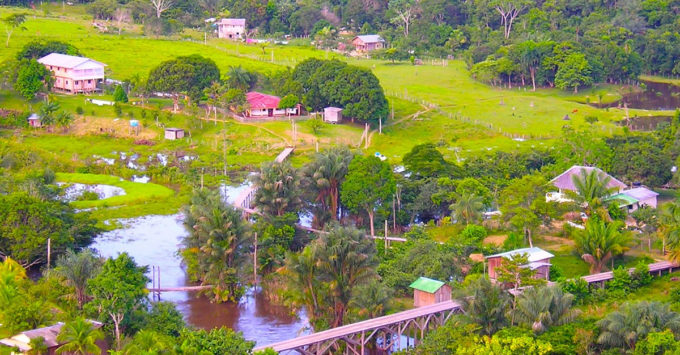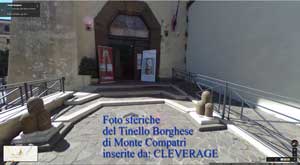Bioregionalism, to overcome political-financial arrogance – Bioregionalismo, per superare l’arroganza politico-finanziaria

Back in the past I was talking to my partner Caterina Regazzi about my political, social and environmental priorities to create a better world. Once again I expressed my desire for the union of all peoples in one human identity. How could the UN have been if they had not prevailed particular interests and crossed vetoes on its operations and consistency.
Humanity is one and even the Earth is one. In a context of universalist awareness, a world government – far from representing the economic interests of financial powers – should represent the interest of the entire terrestrial globe, inserting not only humans but also the others living. If we want this it is also the bioregional vision, in which the territorial areas do not sanction separations but only define the variations of intensity, quality and vital and geomorphological presence.
A little like the human organism which is the inseparable whole of all its organs, distinguishable in their reciprocal but not separable functions. Therefore the interest of an organ must foresee and integrate with the interest of the whole organism.
This holistic feeling is not only the prerogative of bioregional thinking but also the logical conclusion of non-dual philosophy. For example Ramana Maharshi said: “A society is the organism; its constituent members are the arts that perform its functions. A member thrives when he is loyal in service to society as a well-coordinated organ works in the organism. While it is faithfully serving the community, in thoughts, words and deeds, a member of it should promote the cause to the other members of the community, making them aware and encouraging them to be faithful to society, as a form of progress for society. ” Nisargadatta Maharaj said: “We can not be anything but an integral part of total manifestation and total functioning and in no way can we be separated from it”
Therefore, our human presence must be inserted in the context of nature, in the assembly of the living, in holistic and symbiotic sharing.
The first thing to do, at the political level, is the recognition of belonging to the “Common House” and this, if we want, can also be done step by step. As we have been able to recognize our identity first in the family nucleus and in the tribal community, then in the city and in the people and still in the nation, we will be able to recognize the common European roots that all distinguish us.
Certainly not to “separate” the European from the rest of the world, putting it in competition with other ethnic and geographical groups, but to learn to broaden our sense of identity and belonging. Therefore, the implementation of the European Union is, in my opinion, a necessary step to improve our holistic vision. The individual states must merge and renounce their national prerogative. These must be done in full justice and with the consent of the people and not to benefit one state or one economic structure over another. So the basis of the union must not be that of political and economic supremacy of one or more nations, nor must it represent interests alien to the community (banks, multinationals, international financial institutions, etc.).
This is why it is important that – for example – the issue of monetary exchange values is directly managed by the Community government and not by private banks as is the case today with the ECB.
Then there is the other aspect of the valorization and safeguard of the specific cultures and peculiarities of the local communities, the characteristics of these communities can not be represented by “inhomogeneous political regions” but must be restructured in homogeneous bioregional areas. These bioregions will have to present evident affinities of culture and economic forms, as far as man is concerned, and the same applies to the naturalistic, geomorphological, botanical, climatic aspects, etc.
To begin with, large cities must be managed, with their metropolitan areas, in bioregions in their own right, for a proper autonomous management of the performance of its services, supplies, etc. so as not to degrade – as it happens today – the general context of the surrounding territory, also due to the diversity of incidence of the percentage representation of the population and its electoral “weight”. We see it well with what happens – for example – in the Lazio region, often dominated by the deviant interests and phagocytosis of Rome: out of 6 million inhabitants 5 of them live in the city and its banlieu.
In the bioregional administrative reorganization it is also necessary to favor the small communities and the maintenance of their respective habitats and traditional cultures.
By implementing large-scale bioregionalism, Europe will no longer be a non-homogeneous growth of states but the union of small homogeneous and autonomous communities (in internal administrative systems) that share, in the maintenance of cultural diversity, a common identity and a common interest in social and spiritual development. I speak of spiritual and non-religious interest, as religions themselves are separative elements that contrast man with man and man with nature.
Paolo D’Arpini
Italian Bioregional Network
Testo italiano
Tempo addietro stavo parlando con la mia compagna Caterina Regazzi in merito a quelle che sono le mie priorità politiche, sociali ed ambientali per realizzare un mondo migliore. Ancora una volta ho espresso il mio desiderio per l’unione di tutte le genti in un’unica identità umana. Come avrebbe potuto essere l’ONU se non avessero prevalso interessi particolari e veti incrociati sulla sua operatività e consistenza.
L’umanità è una ed anche la Terra è una. In un contesto di consapevolezza universalista un governo mondiale -lungi dal rappresentare interessi economici di potentati finanziari- dovrebbe rappresentare l’interesse di tutto il globo terracqueo, inserendovi non solo gli umani ma anche gli altri viventi. Se vogliamo questa è anche la visione bioregionale, in cui gli ambiti territoriali non sanciscono separazioni ma solo definiscono le variazioni di intensità, di qualità e di presenza vitale e geomorfologica.
Un po’ come avviene per l’organismo umano che è l’insieme inscindibile di tutti i suoi organi, distinguibili nelle reciproche funzioni ma non separabili. Pertanto l’interesse di un organo deve prevedere e integrarsi con l’interesse di tutto l’organismo.
Questo sentire olistico non è solo prerogativa del pensiero bioregionale ma anche la conclusione logica della filosofia non duale. Diceva ad esempio Ramana Maharshi: “Una società è l’organismo; i suoi membri costituenti sono gli arti che svolgono le sue funzioni. Un membro prospera quando è leale nel servizio alla società come un organo ben coordinato funziona nell’organismo. Mentre sta fedelmente servendo la comunità, in pensieri, parole ed opere, un membro di essa dovrebbe promuoverne la causa presso gli altri membri della comunità, rendendoli coscienti ed inducendoli ad essere fedeli alla società, come forma di progresso per quest’ultima.” Ed affermava Nisargadatta Maharaj: “..noi non possiamo essere altro che una parte integrante della manifestazione totale e del totale funzionamento ed in nessuna maniera possiamo esserne separati”
La nostra presenza umana perciò va inserita nel contesto della natura, nel consesso dei viventi, in condivisione olistica e simbiotica.
La prima cosa da fare, a livello politico, è il riconoscimento della appartenenza alla “Casa Comune” e questo, se vogliamo, si può anche fare per gradi. Come siamo stati capaci di riconoscere la nostra identità prima nel nucleo familiare e nella comunità tribale, poi nella città e nel popolo ed avanti ancora nella nazione, saremo in grado di riconoscere le comuni radici europee che tutti ci contraddistinguono.
Certamente non per “separare” l’Europea dal resto del mondo, mettendola in competizione con gli altri raggruppamenti etnici e geografici, ma per imparare ad allargare il nostro senso di identità ed appartenenza. Pertanto l’attuazione dell’Unione Europea è, secondo me, un passo necessario per migliorare la nostra visione olistica. I singoli stati debbono fondersi e rinunciare alla loro prerogativa nazionale. Queste deve avvenire in piena giustizia e con il consenso del popolo e non per avvantaggiare uno stato od una struttura economica rispetto ad un’altra. Quindi la base dell’unione non deve essere quella della supremazia politica ed economica di una o più nazioni né deve rappresentare interessi alieni alla comunità (banche, multinazionali, istituti finanziari internazionali, etc.).
Per questo è importante che -ad esempio- l’emissione dei valori monetari di interscambio comunitario sia direttamente gestita dal governo comunitario e non dalle banche private come avviene oggi con la BCE.
C’è poi l’altro aspetto della valorizzazione e salvaguardia delle culture e delle peculiarità specifiche delle comunità locali, le caratteristiche di queste comunità non possono essere rappresentate da “regioni politiche disomogenee” bensì dovranno essere ristrutturate in ambiti bioregionali omogenei. Queste bioregioni dovranno presentare evidenti affinità di cultura e di forme economiche, per quel che riguarda l’uomo, ed altrettanto dicasi per gli aspetti naturalistici, geomorfologici, botanici, climatici, etc.
Le grandi città tanto per cominciare debbono essere amministrate, con le loro aree metropolitane, in bioregioni a se stanti, per una corretta gestione autonoma dello svolgimento dei suoi servizi, approvvigionamenti, etc. in modo da non far degradare -come oggi avviene- il contesto generale del territorio circostante, dovuto anche alla diversità di incidenza della rappresentatività percentuale della popolazione e del suo “peso” elettorale. Lo vediamo bene con quel che succede -ad esempio- nella Regione Lazio, sovente succube degli interessi devianti e fagocitanti di Roma: su 6 milioni di abitanti 5 di essi vivono nella città e relativa banlieu.
Nel riordino amministrativo a carattere bioregionale bisogna inoltre privilegiare le piccole comunità ed il mantenimento dei rispettivi habitat e delle culture tradizionali.
Attuando il bioregionalismo su ampia scala l’Europa non sarà più un accrocco disomogeneo di stati bensì l’unione di piccole comunità omogenee ed autonome (negli ordinamenti amministrativi interni) che condividono, nel mantenimento delle diversità culturali, una comune identità ed un comune interesse di sviluppo sociale e spirituale. Parlo di interesse spirituale e non religioso, in quanto le religioni stesse sono elementi separativi che contrappongono l’uomo all’uomo e l’uomo alla natura.





-ban.jpg)















































































































































































Non ci sono commenti, vuoi farlo tu?
Scrivi un commento